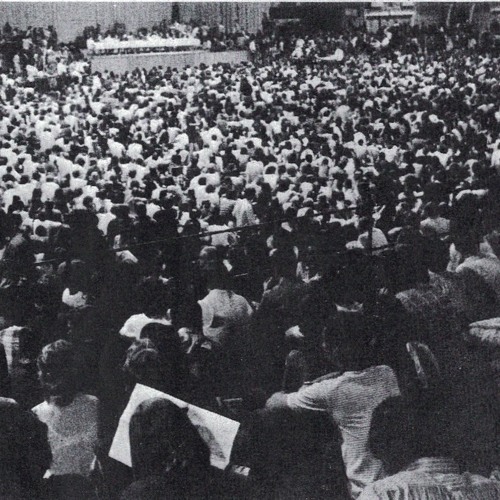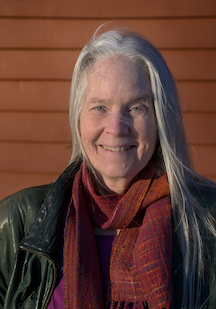It’s been said that if you remember the Sixties, you weren’t really there. So here’s a summary of the relevant chronology:

- 1966: Fr. Berrigan, already deeply involved in activities protesting the Vietnam War, becomes associate director of the Cornell United Religious Work. He is the pastor of the Newman Club (later the Cornell Catholic Community) and the first faculty advisor of the Student Homophile League, Cornell’s first gay student organization.
- May 17, 1968: Berrigan and others, including his brother Fr. Philip Berrigan, pour homemade napalm on draft records at the Catonsville, MD, draft board.
- October 5-9, 1968: The Nine are convicted in a federal trial.
- December 15, 1969: Berrigan is the celebrant at the premiere, held in the Memorial Room of the Straight, of Missa Moratoria, a rock Mass based on his writings.
- April 9, 1970: Berrigan goes underground rather than report to prison.
- April 17-19, 1970: Berrigan makes a surprise appearance at Barton Hall before 10,000+ people at the “America Is Hard To Find” festival (photo at right). He escapes before the FBI can arrest him.
- August 11, 1970: Berrigan is apprehended and serves 18 months in Danbury Federal Prison.
- April 30, 2016: Berrigan passes away a week before his 95th birthday.
From here, Mary picks up the story:
“Father Dan Berrigan’s three years as Associate Director of Cornell United Religious Work came at a historically significant moment and, beyond its celebration of his courage, ‘America Is Hard To Find’ the festival weekend enabled participants to engage in serious discussions of peace, nonviolence, and ethics during a chaotic time, and to plan political action: visiting and lobbying Congress, helping others register to vote, inspiring social engagement and community through the arts. Debate was engaged, on the floor of Barton Hall and well beyond it. Indeed, actions such as those at Catonsville were questioned by some with similar political views; for example, theologian Rosemary Radford Ruether published an excellent essay asking whether finding ways to work with government officials might have more lasting effects than standing against their policies. Others argued there was room, and need, for both approaches. Daniel Berrigan, S. J., was a catalyst in the alembic of the human community.
During my first undergraduate year at Cornell, CURW’s Associate Director, Daniel Berrigan, S. J., was my guiding light — as he was for so many across this nation and the globe – during a crisis and a crossroads in U.S. history. This poet and priest was celebrated at the campus-wide ‘America Is Hard To Find’ festival on April 17 – 19, 1970, bringing people together to discuss the peace movement and non-violence during a time when our nation was at war. Following an Easter pageant by Bread & Puppet Theater and during a Passover Seder on the stage of Barton Hall, Dan briefly addressed an audience of 10,000 people that included the FBI agents tasked with capturing him (who imagined they themselves as incognito in the crowd). In March, Dan Berrigan had chosen to resist his federal prison sentence for an act of war resistance to the U.S. bombing of Vietnam. (“…the burning of paper instead of children…” he wrote of the Catonsville Nine’s napalming Selective Service files.) He published numerous books during a long life dedicated to social justice and world peace.
‘America Is Hard To Find’ began as the title of a 2-page poem by Daniel Berrigan, and later titled a book of his poetry and prose. In between those two formats, the words also served as the title of a rock and roll Mass that was composed for the April 1970 festival and was recorded and issued as an LP with hopes that the album’s sales would defray some of the weekend’s costs for invited speakers and performers. In addition to the Mass, the album contains an 18-minute studio recording of Dan reading his poetry about the Catonsville action and trial.
One of the rock Mass composers, Alan Sorvall, digitized ‘America Is Hard To Find’ the album and had it re-mastered. I have created the website America is Harder to Find to house — for nonprofit historical and educational purposes — archives of and related to that weekend: the music, the recorded poetry, many first-person accounts from students and colleagues, photographs, digitized memorabilia such as the Psychology Today cover quoting Berrigan’s words “don’t just do something, Buddha said, stand there!” (calligraphed by Sister Corita Kent who also did the cover art for the album), a link to the 1-hour documentary ‘The Holy Outlaw’ from 1970 public television, and more. (Many thanks to the good people at Rare Books and Manuscripts in Olin Library for their assistance with my research!) Alan and I met with Dan during the year before his death to let him know this project was in the works.
Alan Sorvall ’67 was a government major in the Arts College. His band Hedge played at the Anabel Taylor Commons coffehouse. His bandmate John Hostetter got to know John Hoover, a former divinity student who ran the Commons, and who was Berrigan’s assistant. Hostetter, a Cornell graduate student working toward an MFA in Theater Arts, was interested in new or different kinds of theater pieces that could bring people together in a quest for peace. Through Hoover he came to know Berrigan, and thus the idea of a rock Mass based on Berrigan’s poetry was born. The Mass came together in the fall of 1969.

Today, Mary (shown at left in a picture by photographer Ben Altman) is a published poet with recordings on the internet as well, and her award-winning collection The Ruined Walled Castle Garden is forthcoming. Some years after graduation she returned to Ithaca and took a one-year teaching position at Cornell that morphed into several decades of same, including helping develop the John S Knight Institute for Writing in the Disciplines. Among her favorite writing seminars that she designed and taught were ‘Ecosystems & Ego Systems’ and ‘America Dreaming’; every course had components of environmental and racial awareness, and discussions of militarism as metaphor in our everyday speech. (Mary says that a ripple effect of this was that “my students helped found the Cornell Greens and the campus chapter of Kyoto! Now, and canvassed individual departments to request they switch to recycled paper before that possibility had reached the general consciousness.”) When Weill Cornell Medicine in Qatar was being set up, she went over to teach for a semester and help set up the school’s writing center.
Along the way, she’s been involved in peace and justice movements such as the Nuclear Freeze Campaign. Mary says, “I’ve been a participant educator in such groupings rather than a partisan. I’ve also spent a deal of time in spirituality, alone and with others; I was one of the founders of the nondenominational Light On The Hill retreat center in Van Etten, 25 miles from Ithaca. (If you’re in the neighborhood, it’s hundreds of beautiful acres and wondrous silence.)”
Thanks, Mary, for that fascinating and relevant bit of the history of our class. And if you, dear reader, have some piece of personal history that intertwines with and illuminates our time at Cornell, drop me a line.